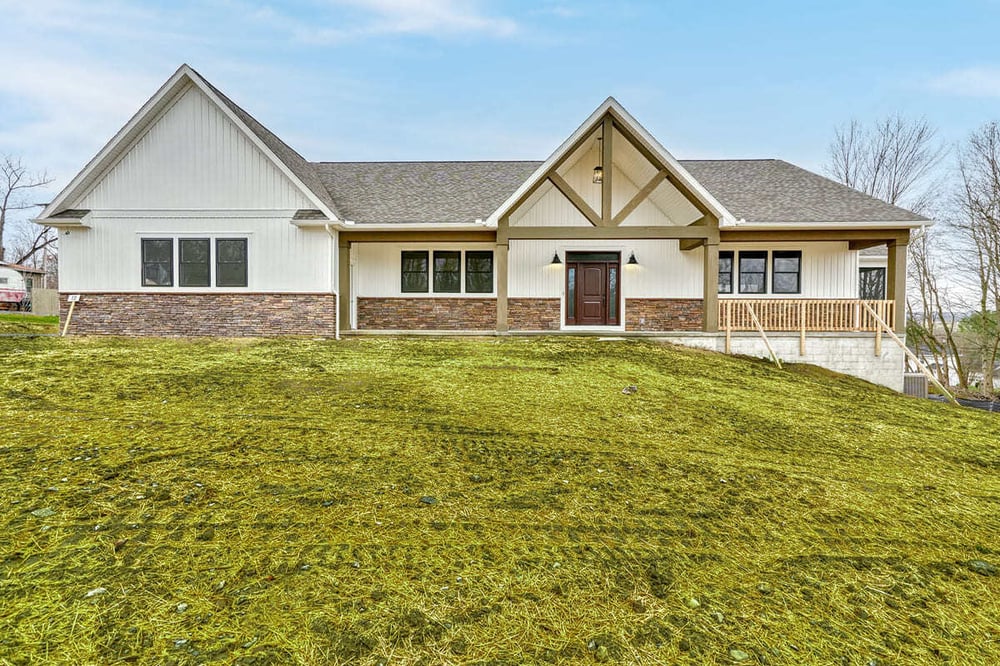
It's almost enough to keep you from starting your home remodel. One of the most prevalent “horror stories” about building a custom home involves completely blowing through the budget long before the work is done. How do you confidently take on your dream custom home-building project with this possibility in the back of your mind? Like almost every important investment and serious dream, it's all about research, skill, and planning. As expert custom home builders in Rochester, NY, we've been designing and creating dream homes on time and budget for decades, and we're happy to show you how it's done.
Creating a Realistic Budget for Your Rochester Custom Home
Establishing a realistic budget is crucial when embarking on a custom home-building project. Start by examining your current funds and exploring financing options if needed. Whether you’re paying in cash, securing a mortgage, or considering a construction loan, understanding your financial limits from the outset will guide your decisions.
Financing for new construction can vary significantly from traditional home loans. It’s important to work closely with a lender experienced in new construction to explore options such as interest-only loans during the construction phase, which then convert to a regular mortgage upon completion. Consider that designing a project at the top of your budget range could be a recipe for disaster. Set aside a contingency fund to cover unexpected expenses during the building process.

Factors Affecting the Cost of Your Custom Home
Your Custom Home Size
It's no surprise that (generally) a bigger house costs more money. Your builder will use more materials and more labor. Of course, this isn't a 1:1 correlation. Each square foot of a home doesn't cost the same amount to build. Larger homes often have a higher proportion of bedrooms and living spaces. However, bigger isn't always better. Consider that you will heat, clean, maintain, and pay taxes on every square foot. Larger homes may have diminishing returns on your experience and enjoyment.
Home Layouts
Size isn’t the only physical characteristic affecting your custom home-building cost. The layout of your home can also have an impact. Some plans are more expensive to build than others. For example, the cost to build your home depends on whether you are building a one-story, one-and-a-half-story, or two-story home. Open floor plans, for example, are popular for their spacious feel and ease of movement, but they may require more extensive structural support, potentially increasing costs. Depending on the materials and finishes you choose, a more traditional layout with separate rooms might be more cost-effective. It's also important to think long-term—how will this floor plan accommodate your family’s needs in the future? Investing in a well-thought-out design now can save you from costly renovations later.

Property
The money you spend on their lot is actually a pretty significant portion of the overall cost of the home. Location and size affect the price of the lot, but the condition (its suitability for building or the cost to make it so) can also significantly impact your budget.
Custom Home Upgrades
It can be tempting to add more finishing upgrades than you really need. It’s not that you shouldn’t splurge on materials and features in your forever home, but lots of little upgrades can add up fast. Intentional upgrades and value engineering during design will ensure your selections serve your needs and style.

Scope Creep: Small Changes to the Plan That Aren’t So Small
This problem affects many homeowners. Part of what makes this issue so insidious is that it doesn’t happen simultaneously. It tends to creep up on homeowners without their awareness. Some builders call it “scope creep,” here’s how it can happen.
It begins when you add “small” features to the plan or contract you’ve already agreed upon with your contractor: “Let’s move that wall 5 inches to the right.” Five inches isn’t much, but sometimes it leads to moving an outlet. In your kitchen, it could mean moving some plumbing. Moving the wall may affect the light in the room, so you want to add a window to compensate. What seemed like a really small change can have a big impact.
Of course, not every change has major ramifications, but you get the picture. Changes happen in small increments that don’t seem like a big deal. But it can cost you considerably more money and add to the time it takes to complete your project.
How can you avoid scope creep?
Start by paying close attention to the plans you and your builder have created before construction so you both know what to expect. If you feel strongly that something needs to change, talk to your builder about it. Tell your team what you want (or don’t want), but don’t dictate the solution. Your builder may devise an answer that doesn’t cost you more or extend your deadline. You'll likely receive one of the following responses when you tell your builder what you want.
- Sure, we can do that! Here’s the revised estimate, reflecting the increased cost.
- No problem! We can make that change, but it will take us an extra week.
- Yes, that’s something we can do. It will cost you an additional $X, and it will take us five days to complete the project.
- Sorry! If you’re not willing to spend any more money or extend the time it will take to complete, we can’t make this change for you.
Sometimes, circumstances beyond anyone’s control (unforeseen increases in material costs) can increase your costs. Unexpected material shortages or bad weather can cause delays. And sometimes, things are just more difficult than expected. That's when an experienced and trustworthy team is an even more important asset.
Managing the Project Timeline
Maintaining a well-structured project timeline is essential to staying within your budget when building a custom home. Delays can lead to increased costs due to extended labor, material price fluctuations, and changes to the plan to accommodate rescheduling. When discussing the project timeline with your builder, ensure they provide a detailed schedule that includes key milestones such as site preparation, framing, roofing, plumbing, and finishing work. This schedule should account for potential delays due to weather or supply chain issues and the process for addressing any unexpected changes that may arise during construction.
Regular communication with your builder at every step is key to keeping the project on track. Set up consistent check-ins to discuss progress and address any concerns immediately. By staying proactive and engaged, you can help prevent small issues from becoming major delays, ultimately protecting your budget and ensuring your custom home is completed on time.

Selecting a Reputable Builder
Choosing the right builder is among the most important decisions during your custom home project. A builder’s reputation for quality, reliability, and staying on budget can make or break your experience. To ensure a successful partnership, take the time to research potential builders thoroughly.

Start by seeking out builders with a strong reputation in your area. Look for reviews, testimonials, and any industry accolades they may have received. A reputable builder will have a portfolio of completed projects that you can review, and they should be willing to provide references from past clients. When speaking with these references, ask specific questions about the builder’s ability to stay on budget, adhere to project timelines, and communicate effectively throughout the process.
It’s also important to verify that your builder is licensed, insured, and in good standing with local regulatory agencies. This protects you legally and provides peace of mind that your builder adheres to industry standards. Additionally, consider whether the builder has experience with the specific type of home you want to build, whether it’s a luxury custom home or a more modest design.
Once you’ve selected a builder, ensure that all agreements are clearly outlined in the contract, including budget expectations, project timelines, and the process for handling changes or unexpected issues. A clear, detailed contract signifies a reputable builder and sets the foundation for a smooth, successful project.
Let's Build Your Finger Lakes Custom Home on Budget Together
Building a custom home is a significant investment, both financially and emotionally. Your partner in this project makes all the difference, whether we’re measuring success by respecting your budget and timeline or your experience after we’re gone. We’d love to help you realize your custom home vision’s full potential. Connect with us today to start the conversation that ends with your dream being realized.







.png)
